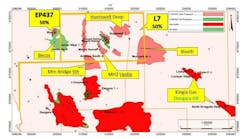HOUSTON, May 2 -- The US Department of Energy's National Petroleum Technology Office, Tulsa, has selected six projects to demonstrate "best practices" for oil producers.
The projects to be funded are the first under the PUMP (Preferred Upstream Management Practices) technology transfer program.
Run as a national competition, PUMP will share the costs of industry-proposed projects that identify technologies that can be deployed rapidly and inexpensively. As the improved techniques are put to use, results will be disseminated to other producers.
The goal is to show how an integrated set of solutions can improve oil field economics, prolong the productive life of many marginal reservoirs, and slow the rate of well abandonments.
DOE said the Gas Technology Institute, Chicago, will develop computer-assisted practices for optimizing oil field operations based on neural networks, genetic algorithms, and "fuzzy" logic. DOE will provide nearly half of the $1.2 million project cost.
The Texas Engineering Experiment Station at Texas A&M University, College Station, has two projects. One will apply practices to waterfloods in the Spraberry trend, a 500,000-acre oil-bearing formation in Midland, Martin, and surrounding counties in West Texas. DOE will pay $362,073 toward the $2 million project.
The station also will develop and demonstrate a practice for increasing oil production by deliberately producing sand from a reservoir, creating a cavity around the wellbore that allows oil to flow more easily from the formation. The technique will be demonstrated at Wilmington field in Long Beach, Calif. DOE will pay half of the $260,000 project cost.
The University of Kansas Center for Research Inc., Lawrence, Kan., will demonstrate techniques for modeling an oil reservoir in a Central Kansas oil field. Using the data, it will drill horizontal infill wells to recover oil that vertical wells may have missed. DOE will pay about half of the $406,086 cost.
The Petroleum Technology Transfer Council, Houston, will work with regional producers in Oklahoma and California to identify and transfer preferred production practices. DOE will pay half of the $1 million cost.
West Virginia University Research Corp., Morgantown, W. Va., will organize a regional council to transfer production technology to operators. DOE will pay about half of the $724,196 cost.
